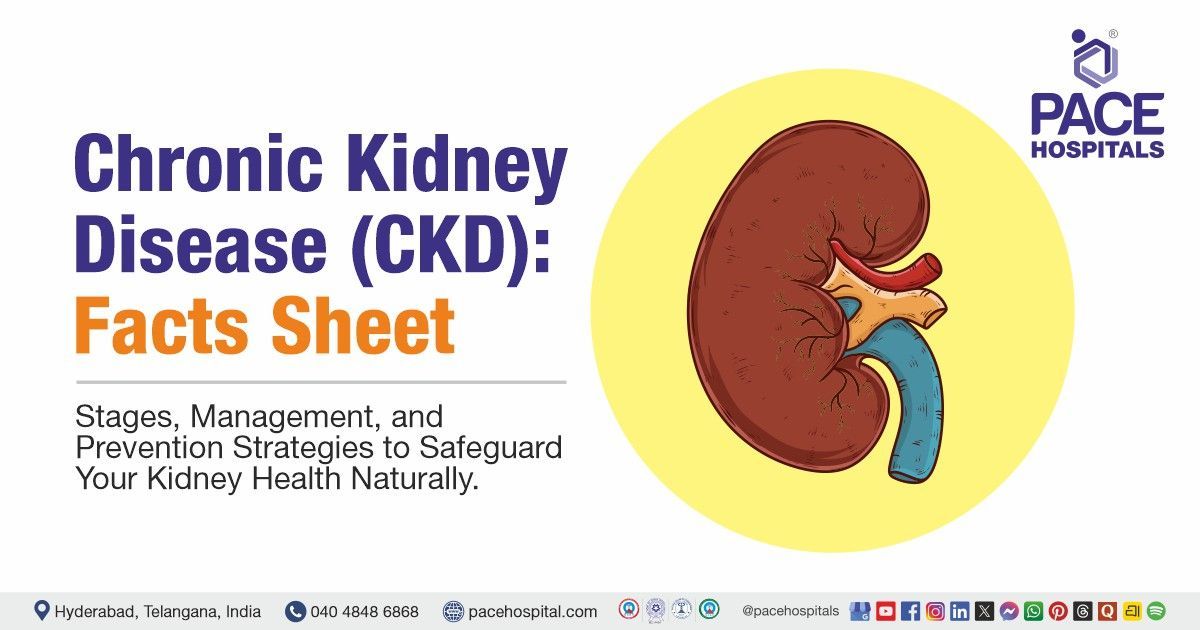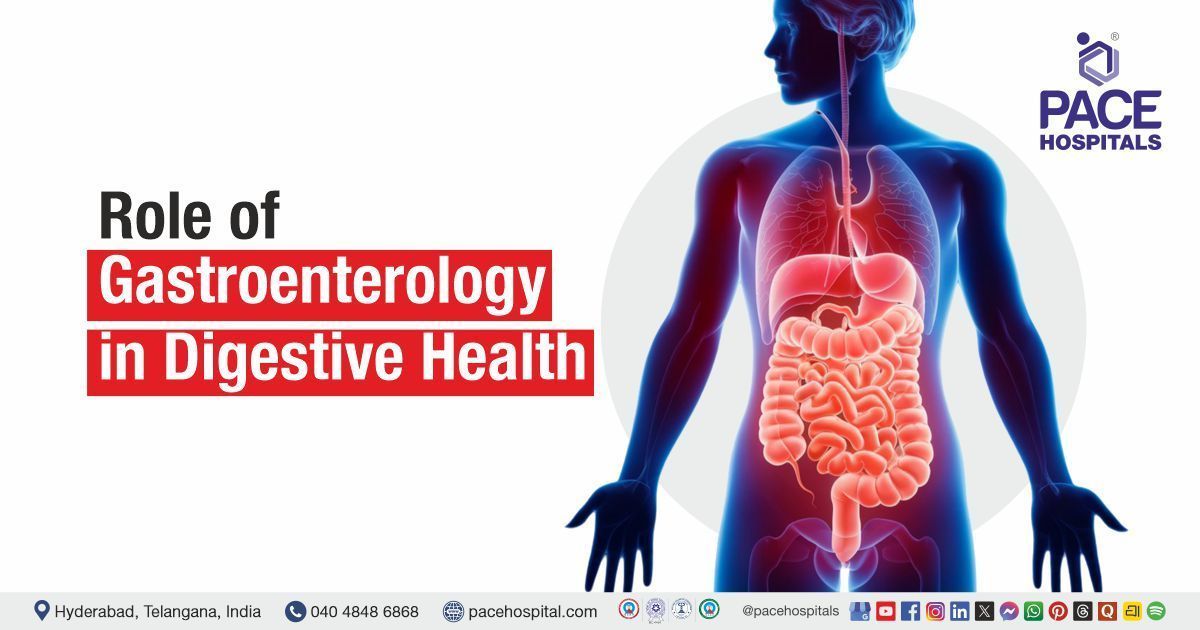Chronic Kidney Disease Fact Sheet – Signs, Stages, and Prevention Tips
PACE Hospitals
Written by: Editorial Team
Medically reviewed by:
Dr. A Kishore Kumar - Consultant Nephrologist and Renal Transplant Physician
Introduction
The kidneys are vital organs that filter blood, remove waste, balance fluids, and produce hormones for blood pressure, red blood cells, and bone health. Proper kidney function is essential for overall health, and damage to them can affect multiple body systems.
When these remarkable organs begin to lose function gradually, the condition is known as Chronic Kidney Disease (CKD). It is often called a “silent disease” because it progresses slowly over time, and symptoms become noticeable only when significant damage has already occurred.
According to global health data, CKD affects nearly 10% of the adult population and has become a major cause of chronic disease and sudden mortality. Early detection and management is essential for avoiding kidney failure and enhancing overall quality of life.
What Do Kidneys Do?
kidneys perform several essential functions every second of the day.
Key Functions of Kidneys:
- Remove toxic waste products from the blood.
- Regulate fluid and salt balance by removing excess water and electrolytes.
- Control blood pressure through the renin-angiotensin-aldosterone system.
- Produce erythropoietin (EPO), a hormone that increases red blood cell formation.
- Without EPO, patients develop anemia (low hemoglobin).
- Maintain bone health by balancing calcium and phosphate levels.
- Regulate acid-base balance to keep blood pH neutral and stable.
When kidneys fail to perform these tasks efficiently, toxins accumulate, resulting in fatigue, swelling, and a host of metabolic complications.
What Is Chronic Kidney Disease (CKD)?
Chronic Kidney Disease (CKD), commonly known as chronic renal failure, is the gradual decline in kidney function over months or years.
It suggests that the kidneys are no longer effective in removing waste and extra fluid from the body, which causes a buildup of toxins in the blood.
CKD is a progressive condition that can gradually proceed to end-stage renal disease (ESRD), which requires dialysis or kidney transplantation to maintain life.
Symptoms of Chronic Kidney Disease
CKD is generally asymptomatic in its early stages, which is why it is considered the "silent killer." Most people don't experience any noticeable symptoms until 90% of kidney function is lost.
As kidney function declines, the following symptoms may appear:
- Poor appetite or loss of taste
- Nausea and vomiting
- Fatigue or generalized weakness
- Swelling (edema) of ankles, feet, or around eyes
- Shortness of breath (due to fluid buildup)
- Itchy or dry skin
- Reduced urine output or changes in urine frequency
- Sleep disturbances or difficulty concentrating
Interestingly, even in advanced stages, patients may continue to produce normal urine volumes. However, this urine is poorly filtered and does not remove waste effectively.
Why It’s Important to Diagnose CKD Early?
Early detection of CKD not only helps preserve kidney function but also prevents serious heart and circulatory complications.
People with CKD are 3–5 times more likely to suffer from:
- Heart attacks
- Stroke
- Peripheral vascular disease
This is because failing kidneys contribute to high blood pressure, cholesterol imbalance, and inflammation, all of which harm blood vessels. Hence, diagnosing CKD early can reduce the risk of life-threatening cardiovascular events.
How Is Chronic Kidney Disease Diagnosed?
Chronic Kidney Disease (CKD) can be detected through simple blood and urine tests, along with imaging studies:
- Glomerular Filtration Rate (GFR)
- GFR measures how effectively the kidneys are filtering blood.
- Low GFR levels indicate the extent of kidney function loss and help stage CKD.
- Knowing the stage guides treatment decisions and helps predict disease progression.
- Blood Tests
- High creatinine and urea show decreased kidney function and monitoring them helps guide treatment.
- Urine Analysis
- Detects protein or blood in urine, early signs of kidney damage.
- Early detection through urine tests can prevent further kidney injury with timely intervention.
- Imaging Studies
- Ultrasound or computed tomography (CT) scans assess the size, shape, and structure of the kidneys, and can reveal blockages, stones, or other abnormalities that lead to CKD.
Stages of Chronic Kidney Disease
| Stage | Stage GFR (mL/min/1.73 m²) | Description |
|---|---|---|
| Stage 1 | 90+ | Indicates normal kidney function but with some signs of kidney damage, such as protein in the urine or structural changes. Early detection allows interventions to prevent further decline. |
| Stage 2 | 60–89 | Mild kidney damage with minimal or no symptoms; regular monitoring and healthy lifestyle changes are advised. |
| Stage 3 | 30–59 | Mild kidney damage with minimal or no symptoms; regular monitoring and healthy lifestyle changes are advised. |
| Stage 4 | 15–29 | Mild kidney damage with minimal or no symptoms; regular monitoring and healthy lifestyle changes are advised. |
| Stage 5 | <15 | Represents very severe kidney failure, also called end-stage renal disease (ESRD). Dialysis or a kidney transplant is usually required to sustain life. |
Who Should Get Tested for CKD?
Anyone who is at high risk of developing renal disease need to undergo testing. You should get a yearly screening if you have:
- Diabetes mellitus
- High blood pressure (hypertension)
- Kidney illness runs in the family.
- Obesity or overweight?
- Age above 50
- History of heart attack or stroke.
- Long-term use of painkillers (NSAIDs) such as diclofenac or ibuprofen
- Abnormal urine tests showing protein or blood
Goals of CKD Treatment
The main goal of treatment is to slow or stop disease progression and prevent complete kidney failure.
Primary Objectives:
- Control the underlying cause (e.g., diabetes, hypertension).
- Maintain normal blood pressure (<130/80 mmHg).
- Reduce protein leakage from urine.
- Manage complications including bone disease,anemia, and electrolyte imbalance.
- Maintain a kidney-friendly diet (lower levels of salt, controlled protein).
Management and Treatment of CKD
- Lifestyle Modifications
- Limit salt intake (<5g per day) to control blood pressure.
- Avoid smoking and alcohol.
- Maintain healthy weight through diet and exercise.
- Stay well hydrated, unless advised otherwise by your doctor.
- Medical Management
- Antihypertensives (ACE inhibitors or ARBs) can help protect renal function.
- People with diabetes need to keep their blood sugar under control.
- Erythropoietin (EPO) treatment for anemia.
- Vitamin D and calcium supplementation can help with bone health.
- Diuretics for swelling or fluid retention.
- Dialysis (Advanced CKD)
- When kidney function drops below 15% (Stage 5), dialysis may be required. Two main types:
- Hemodialysis: It is the process of cleaning blood with a machine.
- Peritoneal dialysis: Filters waste through the body's abdominal lining.
- Kidney Transplant
- In end-stage CKD, a kidney transplant is the most effective long-term treatment option.
Complications of Chronic Kidney Disease
Without timely treatment, CKD can cause:
- Heart disease and stroke – CKD increases strain on the heart and blood vessels, raising the risk of cardiovascular problems.
- Hypertension (High blood pressure) – Damaged kidneys struggle to regulate blood pressure, causing it to rise.
- Anemia (Low red blood cell count) – Kidneys produce less erythropoietin, leading to fewer red blood cells.
- Weak bones – Mineral imbalances from kidney damage make bones fragile.
- Swelling from fluid buildup – Kidneys cannot remove excess fluid, causing edema in the body.
- Imbalance of electrolytes like high potassium levels – Kidneys fail to maintain proper electrolyte balance, which can affect heart and muscle function.
- Nerve damage – Toxin buildup in the blood can harm nerves, causing neuropathy.
- Malnutrition (Poor nutrition) – CKD affects appetite and nutrient absorption, leading to nutrient deficiencies.
Frequently Asked Questions About Chronic Kidney Disease Facts
What is Chronic Kidney Disease (CKD)?
Chronic kidney disease (CKD) is the progressive decrease of kidney function over time. The kidneys remain incapable to filter waste and extra fluid, resulting in toxic buildup in the body.
What are the main causes of CKD?
The two most common causes are diabetes and high blood pressure. Other causes include genetic disorders, kidney infections, autoimmune diseases, and prolonged painkiller use.
How is CKD diagnosed?
It is diagnosed using blood tests (serum creatinine, GFR), urine tests (protein or blood), and imaging studies like ultrasound to assess kidney structure and function.
What are the symptoms of CKD?
Early CKD often has no symptoms. In advanced stages, patients may experience fatigue, swelling, poor appetite, breathlessness, and itching.
Can CKD be cured?
CKD cannot be completely cured, but its progression can be slowed or stopped through proper medical management, diet, and blood pressure control.
How can CKD be prevented?
Managing diabetes, controlling blood pressure, avoiding smoking, maintaining a healthy weight, and regular check-ups can help prevent kidney disease.
What is the treatment for advanced CKD?
Treatment includes medications, dietary modifications, and in late stages, dialysis or kidney transplantation.
Who is most at risk of developing CKD?
People with diabetes, high blood pressure (high BP), obesity, heart disease, or a family history of renal failure are more probable to develop the condition.
What is GFR and why is it important?
GFR (Glomerular Filtration Rate) measures how efficiently the kidneys filter blood. It helps determine the stage and severity of CKD.
Can you live a normal life with CKD?
Yes, many people with early CKD live normal, active lives with timely diagnosis, medical management, and a kidney-friendly lifestyle.
Share on
Request an appointment
Fill in the appointment form or call us instantly to book a confirmed appointment with our super specialist at 04048486868











